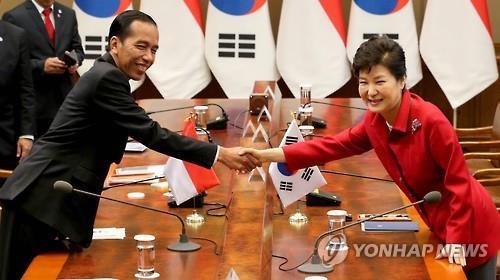South Korea and Indonesia agreed Monday to bolster bilateral cooperation in infrastructure development, trade, investment, maritime affairs, energy and other areas, as the former seeks to step up its foray into the Southeast Asian market.
The two sides signed 11 memorandums of understanding (MOU) largely over firming up their economic ties after President Park Geun-hye and her Indonesian counterpart Joko Widodo held a summit at Cheong Wa Dae, South Korea’s presidential office.
South Korea has been striving to tap into the emerging business opportunities in Indonesia that has a massive market with a population of 250 million. Among the 10 Southeast Asian countries, the Muslim behemoth is South Korea’s third largest trade partner after Vietnam and Singapore.
Through a set of agreements over bilateral cooperation in constructing infrastructure such as power plants, gas pipelines and railways, South Korea seeks to join a series of Indonesia’s development projects worth US$6.7 billion, Cheong Wa Dae said.
The projects are part of Jakarta’s five-year development scheme to refurbish the nation’s aging infrastructure including overland and maritime traffic networks. The mega scheme was launched in 2015.
In particular, the two countries signed an MOU under which the Korea Gas Corporation forms a consortium to participate in a project — worth $600 million — to construct a gas pipeline between Palembang and Bali.
Another MOU was signed to allow the Korea Rail Network Authority to participate in the first stage of a $2.1 billion project to establish a 20-kilometer railway in Jakarta.
The two sides also signed an MOU to bolster cooperation on various maritime affairs including maritime law, environment, security, logistics and fisheries. To effectively enforce the MOU, the two sides agreed to launch a joint committee on fisheries and other maritime issues.
The presidential office said that the MOU would pave the way for South Korean firms to advance into the overseas maritime industries.
The MOU on maritime affairs comes as Indonesia, consisting of some 17,500 islands, pushes to become a maritime hub through a set of projects such as a “sea toll road” project to connect all sea ports in Indonesia through an integrated network.
In an effort to expand trade and investment between the two countries, Park asked Indonesia to reconsider its anti-dumping regulations on South Korea’s steel products and ease relatively high tariffs on some 65 items including cars.
Last year, trade volume between the two countries reached $16.7 billion.
During a joint press conference after the summit, Park pointed out that the two leaders agreed to pursue a “comprehensive” partnership that goes beyond the realm of economic cooperation.
“The two countries have agreed to expand cooperation beyond the economic sector to include areas such as people-to-people and cultural exchanges as well as the defense industry,” she said.
Park also said that they agreed to make continued efforts to stamp out terrorism and violent extremism, and persuade Pyongyang to give up its nuclear ambitions.
Noting South Korea’s role in spurring his country’s industrialization, the Indonesian leader said that the two leaders shared the views that the two nations should work together to “solidify, deepen and expand” their strategic partnership.
He also touched on the importance of two-way cooperation in bolstering the “creative” industry — an industry that capitalizes on creative ideas and cutting-edge technologies. (Yonhap)


